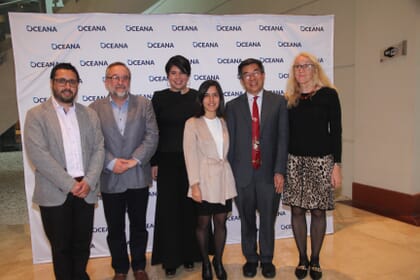
During the international seminar “Salmon farming and antibiotics: threats to human health” held by marine conservation organisation Oceana, experts on bacterial resistance and salmon farming agreed that excessive use of antibiotics in salmon production contributes to increase bacterial resistance to medication and can possibly affect the health of human beings.
At the event, Dr. Anthony So, Director of the Strategic Policy Program of global network Re-Act (Action on Antibiotic Resistance), said that 700,000 people die each year due to antimicrobial resistant infections, and that number is expected to rise to more than 10 million people by the year 2050, even exceeding deaths by cancer, thus becoming the primary cause of death.
During his presentation, Dr. So also explained how resistant bacteria can be transmitted to human beings from the animal industry, considering that over 70% of antimicrobials utilised in the world are assigned to veterinary purposes. In this sense, he emphasised that transmission can come from the farms or the products we buy and that end up on our tables. But transmission can also occur through traces of antibiotics left in the environment due to their use in salmon farming.
Dr. Alejandro Buschmann, marine biologist and senior faculty member at Universidad de Los Lagos, said that salmon farming produces residual antibiotic concentrations in the marine environment, increasing resistant bacteria, which can affect not only animal production, but increase the risks to human health as well. Buschmann added that scientific evidence suggests that transferring marine bacterial resistant genes to humans is possible, and that the antibiotics used can enter the trophic network and reach humans.
“In Chile, the salmon farming industry is the one that most uses antibiotics, which is why it is so important to invest on science and innovation to understand the bacterial resistance phenomena generated by its veterinary use”, said Liesbeth van der Meer, Executive Director of Oceana Chile. “In salmon farming, bacterial resistance remains in Chile’s fiords and can then expand and first affect people who live or work near salmon farms, making it urgent to take measure to reduce the use of antibiotics”, she added.
Dra. Brit Hjeltnes, from the Norwegian Veterinary Institute, talked about how that country, the primary salmon producer of the world, was able to reduce the use of antibiotics to practically zero through an initial reduction in production, which contrasts with the Chilean reality, where the high use of antibiotics is one of the industry’s main problems; and Dr. Jorge Olivares of the Pontifical Catholic University of Valparaíso presented his recent study establishing a clear relationship between the use of antibiotics and the presence of resistant bacteria in Atlantic salmon.
The seminar ended with a conversation in which experts presented suggestions to curb bacterial resistance, agreeing that Chilean salmon farming needs to reduce and regulate the use of antibiotics and invest in science and innovation.
